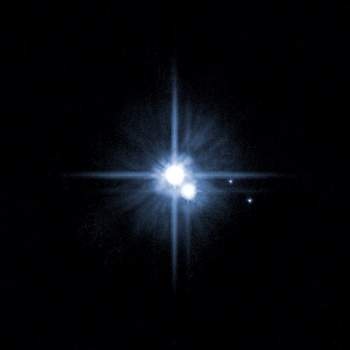
The names of two moons of Pluto that were discovered recently have been finalised by the International Astronomical Union (IAU). The names have been selected after a lot of consideration that also involved seeking opinion of the general masses through an online poll.
According to the statement present on the IAU’s website:
“The IAU is pleased to announce that today it has officially recognised the names Kerberos and Styx for the fourth and fifth moons of Pluto respectively (formerly known as P4 and P5). These names were backed by voters in a recently held popular contest, aimed at allowing the public to suggest names for the two recently discovered moons of the most famous dwarf planet in the Solar System.”
A couple of years ago, the number of known Pluto moons was three. However, in 2011 and 2012 the NASA/ESA Hubble Space Telescope Wide Field Camera 3 found something surprising that eventually led to the discovery of two new moons, taking the total number of Pluto moons to five.
Once the moons were discovered, the IAU assigned the task of naming them to the leader of the research team, Mark Showalter. He thought it prudent to know what people thought of it and organised an online poll. The people could have chosen from a range of options that included Acheron, Alecto, Cerberus (Kerberos in Greek), Erebus, Eurydice, Hercules-Heracles, Hypnos, Lethe, Obol, Orpheus, Persephone, Styx, Vulcan, Elysium, Hecate, Melinoe, Orthrus, Sisyphus, Tantalus, Tartarus and Thanatos.
A total of 450,324 people took part in the voting and Vulcan received the highest number of votes (over 150,000). However, that name was not selected and the names that came second and third in the polling were eventually chosen, though the authorities said to be overwhelmed with the world’s response. The reason for not choosing Vulcan, as stated by the IAU, is:
“The name Vulcan had already been used for a hypothetical planet between Mercury and the Sun. Although this planet was found not to exist, the term “vulcanoid” remains attached to any asteroid existing inside the orbit of Mercury, and the name Vulcan could not be accepted for one of Pluto’s satellites (also, Vulcan does not fit into the underworld mythological scheme).”
Photo: AP/NASA